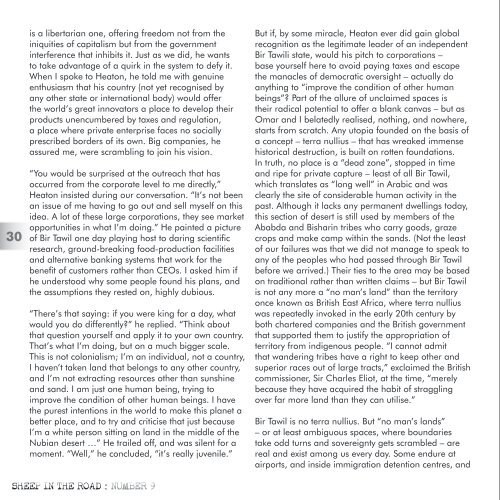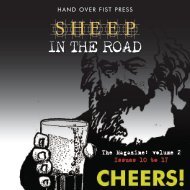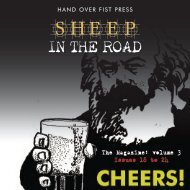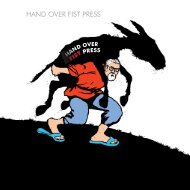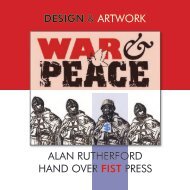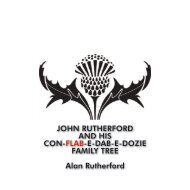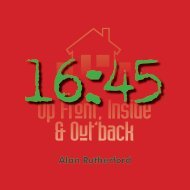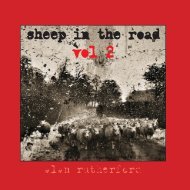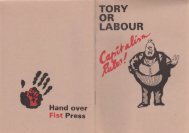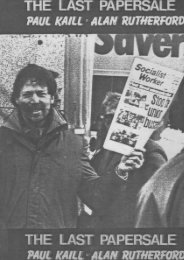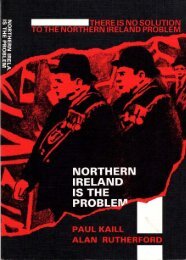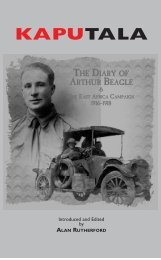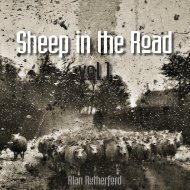Sheep magazine archive 1: issues 3-9
Lefty online magazine, issue 3: October 2015 to issue 9: April 2016
Lefty online magazine, issue 3: October 2015 to issue 9: April 2016
- No tags were found...
You also want an ePaper? Increase the reach of your titles
YUMPU automatically turns print PDFs into web optimized ePapers that Google loves.
30<br />
is a libertarian one, offering freedom not from the<br />
iniquities of capitalism but from the government<br />
interference that inhibits it. Just as we did, he wants<br />
to take advantage of a quirk in the system to defy it.<br />
When I spoke to Heaton, he told me with genuine<br />
enthusiasm that his country (not yet recognised by<br />
any other state or international body) would offer<br />
the world’s great innovators a place to develop their<br />
products unencumbered by taxes and regulation,<br />
a place where private enterprise faces no socially<br />
prescribed borders of its own. Big companies, he<br />
assured me, were scrambling to join his vision.<br />
“You would be surprised at the outreach that has<br />
occurred from the corporate level to me directly,”<br />
Heaton insisted during our conversation. “It’s not been<br />
an issue of me having to go out and sell myself on this<br />
idea. A lot of these large corporations, they see market<br />
opportunities in what I’m doing.” He painted a picture<br />
of Bir Tawil one day playing host to daring scientific<br />
research, ground-breaking food-production facilities<br />
and alternative banking systems that work for the<br />
benefit of customers rather than CEOs. I asked him if<br />
he understood why some people found his plans, and<br />
the assumptions they rested on, highly dubious.<br />
“There’s that saying: if you were king for a day, what<br />
would you do differently?” he replied. “Think about<br />
that question yourself and apply it to your own country.<br />
That’s what I’m doing, but on a much bigger scale.<br />
This is not colonialism; I’m an individual, not a country,<br />
I haven’t taken land that belongs to any other country,<br />
and I’m not extracting resources other than sunshine<br />
and sand. I am just one human being, trying to<br />
improve the condition of other human beings. I have<br />
the purest intentions in the world to make this planet a<br />
better place, and to try and criticise that just because<br />
I’m a white person sitting on land in the middle of the<br />
Nubian desert …” He trailed off, and was silent for a<br />
moment. “Well,” he concluded, “it’s really juvenile.”<br />
But if, by some miracle, Heaton ever did gain global<br />
recognition as the legitimate leader of an independent<br />
Bir Tawili state, would his pitch to corporations –<br />
base yourself here to avoid paying taxes and escape<br />
the manacles of democratic oversight – actually do<br />
anything to “improve the condition of other human<br />
beings”? Part of the allure of unclaimed spaces is<br />
their radical potential to offer a blank canvas – but as<br />
Omar and I belatedly realised, nothing, and nowhere,<br />
starts from scratch. Any utopia founded on the basis of<br />
a concept – terra nullius – that has wreaked immense<br />
historical destruction, is built on rotten foundations.<br />
In truth, no place is a “dead zone”, stopped in time<br />
and ripe for private capture – least of all Bir Tawil,<br />
which translates as “long well” in Arabic and was<br />
clearly the site of considerable human activity in the<br />
past. Although it lacks any permanent dwellings today,<br />
this section of desert is still used by members of the<br />
Ababda and Bisharin tribes who carry goods, graze<br />
crops and make camp within the sands. (Not the least<br />
of our failures was that we did not manage to speak to<br />
any of the peoples who had passed through Bir Tawil<br />
before we arrived.) Their ties to the area may be based<br />
on traditional rather than written claims – but Bir Tawil<br />
is not any more a “no man’s land” than the territory<br />
once known as British East Africa, where terra nullius<br />
was repeatedly invoked in the early 20th century by<br />
both chartered companies and the British government<br />
that supported them to justify the appropriation of<br />
territory from indigenous people. “I cannot admit<br />
that wandering tribes have a right to keep other and<br />
superior races out of large tracts,” exclaimed the British<br />
commissioner, Sir Charles Eliot, at the time, “merely<br />
because they have acquired the habit of straggling<br />
over far more land than they can utilise.”<br />
Bir Tawil is no terra nullius. But “no man’s lands”<br />
– or at least ambiguous spaces, where boundaries<br />
take odd turns and sovereignty gets scrambled – are<br />
real and exist among us every day. Some endure at<br />
airports, and inside immigration detention centres, and<br />
SHEEP IN THE ROAD : NUMBER 9


